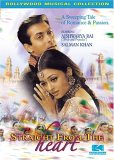| Reviews & Columns |
|
Reviews DVD TV on DVD Blu-ray 4K UHD International DVDs In Theaters Reviews by Studio Video Games Features Collector Series DVDs Easter Egg Database Interviews DVD Talk Radio Feature Articles Columns Anime Talk DVD Savant Horror DVDs The M.O.D. Squad Art House HD Talk Silent DVD
|
DVD Talk Forum |
|
|
| Resources |
|
DVD Price Search Customer Service #'s RCE Info Links |
|
Columns
|
|
|
Straight From the Heart
India may be the only major film market left in the world where the movie musical is still the thriving genre it had been in America and elsewhere in the 1930s-1960s. Beyond the qualities of the film itself, from a genre-watching point-of-view it's a fascinating experience. Many of the conventions are the same while others are very different. There are cultural differences, of course, but a lot of it has to do with the fact that American musicals have become so rare, one can't help speculating through movies like Straight from the Heart how American musicals might have evolved into the 21st century if the genre had petered out so long ago.
The film's basic story will be familiar to anyone versed in Deanna Durbin, the RKO musicals of Fred Astaire and Ginger Rogers, and it's even reminiscent in some ways of Harold Lloyd's silent romantic comedies. A cocky, breezy singer, Sameer (Salman Khan), half-Indian, half-Italian, arrives at the palatial estate of acclaimed music teacher Pundit Darbar (Vikram Gokhale). Annoyed that Sameer is to take over her bedroom, Pundit's daughter Nandini (Aishwarya Rai) conspires to sabotage the houseguest's welcome, but over the course of eight months passionately falls in love with him.
Meanwhile, Nandini's parents arrange for their daughter to marry Vanraj (Ajay Deygan), a kind but introverted attorney. When Pundit learns that Nandini and Sameer have been seeing one another in secret, and that together they conspired to help Nandini's older sister escape an unhappy marriage, he orders Sameer to leave and never see his daughter again. And that's just the first hour of this three-hour and eight-minute epic.
Straight from the Heart dazzles with its vivid use of color, costumes, and music; it's like being caught up in an exploding candy store. It compares favorably to the Powell-Pressburger Technicolor films of the 1940s and early '50s, and is a feast for the eyes. Director Sanjay Leela Bhansali dominates his musical numbers with movement rather than MTV or Michael Bay-style editing. Instead he prefers having his singers glide past the camera, they moving their bodies as the camera tracks, too, often in the opposite direction. In general, even between songs, the actors move with a grace worthy of the best Hong Kong stars (martial arts fans seem to like Bollywood musicals, and vice-versa); interestingly, even when the story moves to Italy (in scenes actually filmed in Budapest, which doesn't much look like Italy) for the last act, the non-Indian characters tend to act and move like the Indian ones, an odd sight.
The staging of both the musical and non-musical sequences is inventive and colorful. Nandini and Sameer meet-cute as she lights the candles in a lowered chandelier; later, when they're torn apart by Nandini's angry father, she runs off in a panic and the train of her gown catches fire on the again-lowered chandelier, a neat little reference.
Though its story might easily have been condensed into an 80-minute feature, Straight from the Heart is never boring, and its characters engrossing if melodramatic. Bhansali and co-story writer Pratap Karvat work hard to make their characters believable. In a nice touch, they eschew the conventional makeup of such love triangles by making both Sameer and Vanraj equally attractive (if in entirely different ways), equally flawed, and Nandini in one long sequence quite selfish and unlikable. To the film's credit you may find yourself guessing until the final minutes who'll Nandini wind up with. Similarly, Nandini's parents and various aunts, sisters, and cousins (17 in Nandini's family alone) are colorful and interesting.
The leads are attractive and appealing. Aishwarya Rai, reigning "Queen of Bollywood" and considered one of the most beautiful women in the world, was recently profiled on 60 Minutes and has several American movies waiting in the wings. Worldwide stardom seems inevitable. Salman Khan, by all reports, is not unlike his cocky character here and for a time the film inspired a real-life and highly-publicized romance with Rai. Helen (no other name given), one of the stars of Gumnaam, makes a "special appearance" as Khan's mother.
Video & Audio
Straight from the Heart is presented in its original Hindi with optional English subtitles. (English is mixed with much of the Hindi dialogue, and Hungarian is heard in the, uh, Italian scenes.) Pathfinder's presentation is fine, though the subtitles occasionally are a line behind the dialogue. The 16:9 transfer preserves the original CinemaScope-shaped widescreen image of 2.35:1. The Dolby Digital Stereo is very good, and shows off the musical numbers (the DVD features a separate song index) to good effect. There's an intermission card almost exactly halfway through the picture. There are no Extra Features.
Parting Thoughts
Though it makes for a long night's viewing, and the conventions of Indian musicals may be unfamiliar to most Western audiences, Straight from the Heart is definitely worth the effort, a joyous and colorful spectacle for all ages.
Stuart Galbraith IV is a Kyoto-based film historian whose work includes The Emperor and the Wolf - The Lives and Films of Akira Kurosawa and Toshiro Mifune and Taschen's forthcoming Cinema Nippon. Visit Stuart's Cine Blogarama here.
|
| Popular Reviews |
| Sponsored Links |
|
|
| Sponsored Links |
|
|
| Release List | Reviews | Shop | Newsletter | Forum | DVD Giveaways | Blu-Ray | Advertise |
|
Copyright 2024 DVDTalk.com All Rights Reserved. Legal Info, Privacy Policy, Terms of Use,
Manage Preferences,
Your Privacy Choices | |||||||














